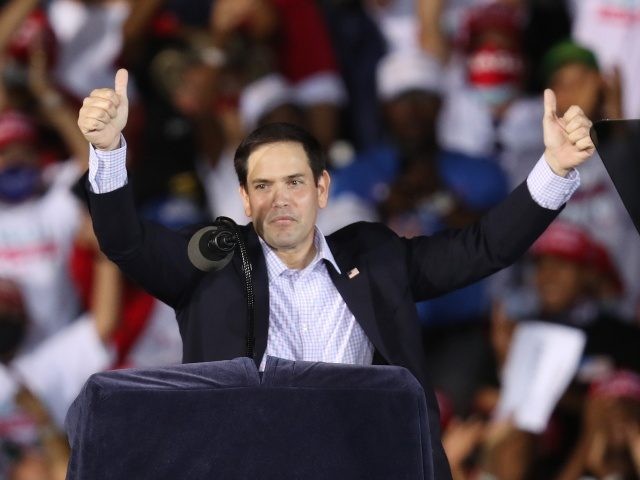Sen. Marco Rubio (R-FL) says the Republican Party’s future is “based on a multiethnic, multiracial working class coalition” that is skeptical about free trade, big business, and elites throughout the nation’s institutions — the base that President Trump coalesced for his 2016 and 2020 economic nationalist campaigns.
In an interview with Axios, Rubio said the GOP base — comprised of a majority of working and lower middle class Americans — must drive the party’s agenda and should remain suspicious of concentrated corporate power, free trade, and the ruling class.
Rubio said Republicans have long believed in and supported the free market, “but the free market exists to serve our people. Our people don’t exist to serve the free market.” [Emphasis added]
He added that working class Americans are now largely against big businesses “that only care about how their shares are performing, even if it’s based on moving production overseas for cheaper labor.” [Emphasis added]
“They’re very suspicious, quite frankly, dismissive of elites at every level. And obviously that’s a powerful sentiment.” [Emphasis added]
Rubio chided the Republican Party’s donor wing, noting their fundamentalism toward supporting the outcomes of the free market regardless of whom it hurts. Rubio said many in the donor wing and GOP think tanks “accuse anyone who’s not a market fundamentalist of being a socialist to some degree.”
“If the takeaway from all of them is now is the time to go back to sort of the traditional party of unfettered free trade, I think we’re gonna lose the [Trump] base as quickly as we got it … we can’t just go back to being that,” Rubio said.
Trump’s building out of the GOP base to a large coalition centers on the defense of America’s working and lower middle class that have been decimated by decades of corporate consolidation, free trade, and China’s entering the World Trade Organization.
That opposition to globalization of the American economy has been coupled with a sense of wariness of the nation’s mass importation of illegal aliens, foreign visa workers, and a record number of legal immigrants. The overwhelming majority immediately enter the labor market and begin competing for jobs against working and lower middle class Americans, driving down wages in the process.
Trump’s approach, across the board, has been to reduce foreign competition against Americans through tariffs on foreign imports and a tightening of the labor market via a reduction of immigration.
Despite the party establishment’s wanting to return to a business-friendly, donor class driven agenda, Republican voters have repeatedly said they are the most skeptical of free trade and globalization. Likewise, weekly polling has shown for years that GOP voters want less immigrati0n to the United States.
On key economic nationalist policy prescriptions, a huge majority of Americans want more tariffs on foreign imports, mandatory country-of-origin labeling, and a requirement that goods be made in the U.S.
John Binder is a reporter for Breitbart News. Follow him on Twitter at @JxhnBinder.

COMMENTS
Please let us know if you're having issues with commenting.